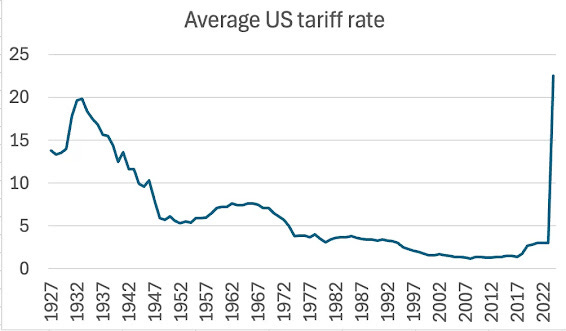A Few Observations About the Trump Tariffs

Source: USITC and Yale Budget Lab
This charts says it all. The Trump tariffs announced yesterday have resulted in an average US tariff rate higher than the infamous Hoover Administration era Smoot-Hawley Tariffs that caused our economy to go into a tailspin. And the folks who know the US economy better than anyone--the folks that buy and sell stocks--have given their view of the tariffs: as I write this, the S&P index is down more than 4%.
Here are some observations about the tariffs.
First, they stupidly include items that the US does not produce, and because of geography will likely never produce, including common grocery items as coffee, banana, winter fruits and vegetables, and chocolate. To what end? There won't be any insourcing of these items, and no new US jobs will result from the tariffs. All that will happen is that the cost of groceries for Americans will go up for Americans. The Yale Budget Lab model estimates that the tariffs will increase fresh produce by 4% and overall food prices will rise 2.8%.
Second, for a large number of manufacturing items such as automobiles and smart phones, even if companies want to onshore production in the U.S., it will take years to make the adjustment. Companies have to live with existing contractual arrangements and raise the capital and construct new facilities in the US. This takes time, and given that tariff policy has become so political and unpredictable, it is not at all certain that companies will find new investments in the US to be a good bet. In the meantime, US consumers have to live with higher prices. The Yale Budget Lab Model predicts that the tariffs will increase the average price of an average 2024 new car by $4000.
Third, the new tariffs are not even remotely "reciprocal." Our trading partners don't have tariffs even remotely as high as the Trump tariffs. Instead, the tariffs were set by a formula that divided the trade deficit by the total total exports to America, despite the fact that country's trade deficit may have nothing to do with tariffs or other policies.
Fourth, the impact on Americans from these tariffs will be significant. The Yale Budget Lab Model estimates that the average household loss will be $2,100, with the highest impact (as a percentage of household income at the lower and middle income distribution.
Finally, this strikes me as a rather significant action by the President. It is effectively the most significant tax increase in American history, In recent Supreme Court decisions, the Court has said that the executive branch is limited in its ability to act on issues of great political or economic significance absent clear congressional authorization. This principle was used to strike down the Biden Administration's student loan forgiveness initiative. It seems to me that the biggest tax increase in US history qualifies as a matter of great economic significance, and reliance on vague emergency powers should not be sufficient. I look forward to the conservatives on the Supreme Court acting in a principled way to struck down these tariffs.



